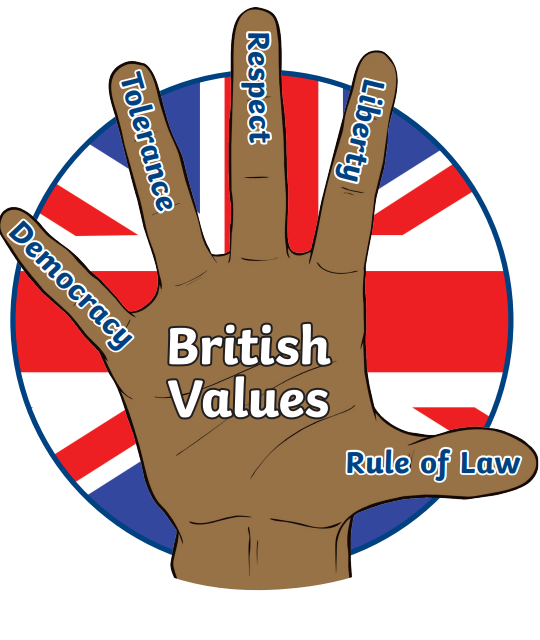The British Values fall into the following broad areas:

Promotion of these values is in order to ensure that young people leave school understanding the importance of respect and are prepared for life in modern Britain.
In 2014, Lord Nash said: “A key part of our plan for education is to ensure children become valuable and fully rounded members of society who treat others with respect and tolerance, regardless of background.”
Lime Hills Academy has its own core values that are taught with and complement the British Values. These are Belonging, Resilience, Kindness and Trust.

All school culture is led through the Cabot Learning Federations HEART values

Here are some of the ways British values are embedded in the school community.
Democracy
- Understanding of self as part of a class is taught explicitly through attention and engagement lessons.
- Class votes for reward activities or trips.
- Pupils decide on class rules.
- Natural consequences are explored to ‘make things better’, when things have gone wrong. Staff support students throughout this restorative process, promoting self-reflection, as appropriate.
- Each class votes in a representative for the School Council.
- Participation in the Trust Pupil Parliament.
- PSHE curriculum.
- Students form part of the interview process for new staff.
The Rule of Law
- PSHE curriculum
- Understanding own rights and the need for positive behaviours
- Beginning to understand that there are laws to protect them in society and if they are broken there are consequences.
- Natural consequences are explored to ‘make things better’, when things have gone wrong. Staff support students throughout this restorative process, promoting self-reflection, as appropriate.
- Laws specific to their age group – e.g. laws about consent and sexual activity, drugs, alcohol, film and game classifications.
- YOT representatives visit and talk to young people about sentencing and youth community orders.
- Understanding what to do if they think someone is breaking a rule or law.
Individual liberty
- PSHE curriculum.
- Speech and language informed staff to develop communication skills.
- Choices being embedded throughout the day, as appropriate.
- All about me
- Beginning to understand that sometimes, as a child, some decisions are made on our behalf, in our best interests.
- Unsafe or disruptive choices reflected on by staff and student, as appropriate.
- Successes celebrated through celebration assemblies.
- Behaviour choices – choosing to make the right choice in a school where behaviour is supported by the Team Teach model.
- Learning about choices and options for Post 16
- Understanding that with liberty comes responsibility.
- Relationship choices – choosing and saying ‘no’ through the delivery of PSHE and Jigsaw.
- Community visits and projects, to help individuals understand their role in the community and the individual liberties that need to be respected within a community.
- Class jobs.
- Engagement with the world of work
- Travel training – increasing independence.
Mutual respect
- PSHE curriculum.
- RE curriculum
- Exploring differences including Neurodiversity
- Natural consequences are explored to ‘make things better’, when things have gone wrong. Staff support students throughout this restorative process, promoting self-reflection, as appropriate.
- Children learn that the choices that they make have an impact on those around them.
- 5 Point Scales – morning and afternoon check-ins.
- Teamwork in lessons.
- Giving feedback to others on their performance.
- Awards and certificates in assemblies to celebrate each other’s achievements
- The way that staff model respectful behaviour towards each other and to younger people builds respect across the whole school population.
- Understanding each other’s differences and how to respect one another in PSHE.
- PSHE curriculum enables students to talk openly about their difficulties and understand/support one another.
Tolerance of those of different faiths and beliefs
- PSHE curriculum.
- RE curriculum.
- Ensuring that resources used in lessons reflect the multi-cultural nature of modern Britain
- RE topics morals and religious stories, places of worship, religious beliefs, non-religious worldviews, creation stories and Gods around the world.
- RE trips to places of worship.
- Themed sessions around religious festivals, throughout the year.
- Positive examples from across different faiths and beliefs used as part of lessons and learning.
- Proper consideration of needs of those where practices relating to faith are carefully considered. For example, during Ramadan.



